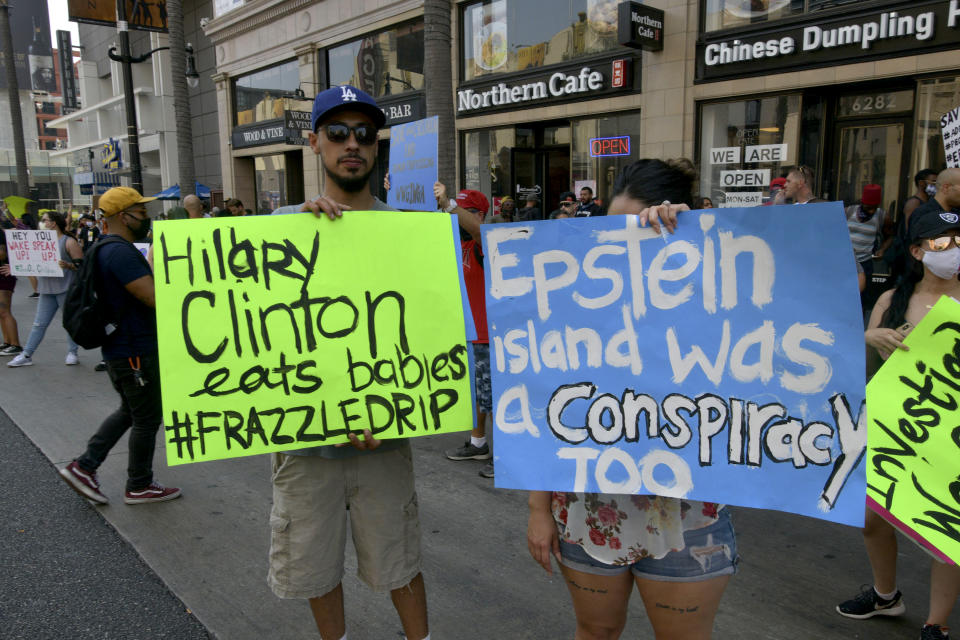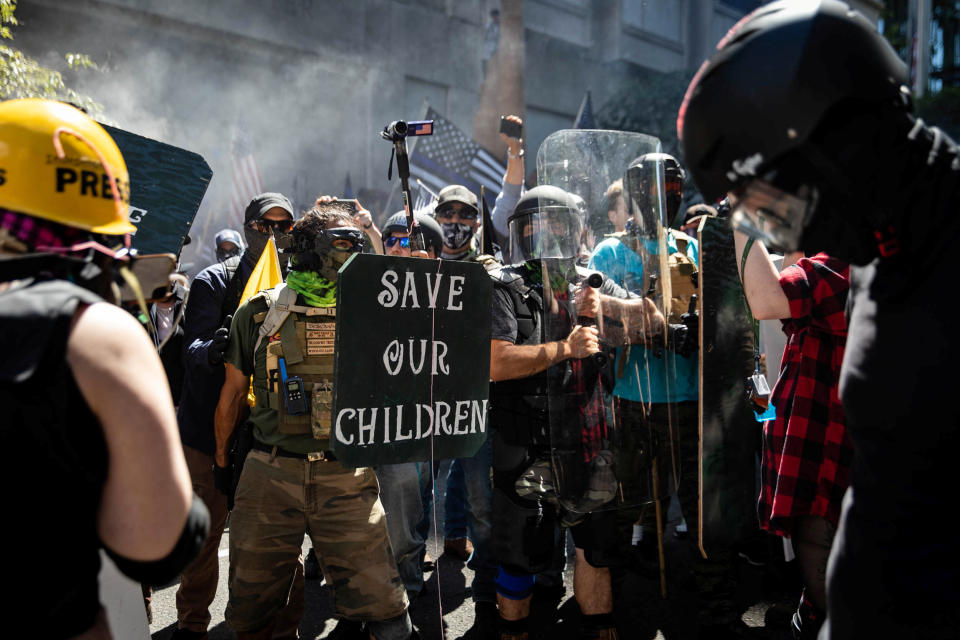How QAnon is undermining the real global fight against human trafficking
In 1910, undercover agents in New York reportedly thwarted attempts to sell four girls into prostitution. Two of the girls, according to a New York Times story at the time, were only “children of 15 who played with a doll and a teddy bear.” Stories like this one, denouncing the sale of young women and children, typically by foreign immigrants, fueled the white slavery moral panic that spread across United States and Europe in the early 1900s.
Today, historians believe that those stories were significantly inflated and racialized accounts of urban prostitution and sex work. Yet more than a century later, these tales, sometimes apocryphal, have returned with QAnon, the fringe movement that pulls together a collection of conspiracy theories, including the idea that President Trump is fighting a politically connected global sex trafficking ring.
While the problem of sex trafficking is real, QAnon has relied mostly on exaggerated figures and misinformation about the nature of these activities, combining some real cases, like that of financier Jeffrey Epstein, with some blatantly false ones, like an alleged pedophile ring run from the basement of a Washington pizza restaurant (which has no basement).
In many ways, the sensationalist stereotypes of sex trafficking victims promoted by QAnon followers echo the “white slavery” narratives that spread in U.S. media in the early 1900s. The current proliferation of unrealistic depictions of trafficking victims being kidnapped and “tied up” — frequently by foreigners — obscures the more complex and yet mundane ways in which this crime actually takes place. Instead, human traffickers are more likely family members, intimate partners or trusted adults known to the victims.

More than just obscuring the bigger problem, QAnon threatens to undermine decades of progress made to combat human trafficking. QAnon’s outlandish claims and its attempts to manipulate human trafficking policies for political purposes threaten to erode the international credibility of the U.S. as a global leader in this field and derail the significant progress made in the international fight against human trafficking.
This week marks the 20th anniversary of the enactment of the Trafficking Victims Protection Act in the United States. Passed with broad bipartisan support by Congress on Oct. 28, 2000, the law established trafficking in people as a federal crime and provided a framework for the protection of trafficking victims.
The act included a requirement for the secretary of state to prepare an annual report ranking foreign governments’ anti-trafficking efforts based on the extent to which they comply with the minimum standards outlined in the U.S. legislation. These annual reports also use a tiered ranking to identify countries working to combat trafficking.
Despite shortcomings in those reports and the rankings, evidence suggests they have contributed to the expansion and implementation of anti-trafficking efforts around the world. In Scorecard Diplomacy, for example, Duke University professor Judith Kelley uses data from multiple sources, including WikiLeaks cables, to show how foreign governments worry about their reputations and about how they are ranked in the annual report. Some countries, like Thailand, go as far as hiring legal firms to improve their image and rankings. And evidence shows that countries that are given negative rankings are more likely to make efforts to improve their anti-trafficking policies.

The U.S. government not only was one of the main sponsors of the 2000 United Nations Protocol to Prevent, Support, and Punish Trafficking in Persons, Especially Women and Children, but it has also actively promoted implementation of anti-trafficking policies worldwide through its annual Trafficking in Persons, or TIP, reports.
To the casual observer, the recent hype in the media about a secret cabal of celebrities, politicians and businesspeople involved in the kidnapping of children for sex trafficking and blood harvesting may be seen as contributing to these anti-trafficking efforts. While outlandish, QAnon’s claims have increased public interest in the issue, as the surge in the use of hashtags like #SavetheChildren and #sextrafficking in social media shows. They have also spread internationally, fueling “Save the Children” rallies in several cities in Britain and a Pizzagate-inspired business boycott in France.
So why has a group of more than 90 anti-trafficking organizations in the U.S. signed an open letter condemning the QAnon movement and rejecting its sex trafficking allegations?
The distorted picture of trafficking victims promoted by QAnon conspiracy theorists exacerbates an enduring problem in the anti-trafficking movement in the U.S. and abroad: its excessive preoccupation with sex trafficking while neglecting labor trafficking, a crime that is as prevalent as — if not more than — sexual exploitation. Sex trafficking of women and children not only receives greater media coverage but is also the focus of more attention by law enforcement and federal prosecutors.
Limited attention to trafficking cases in the media translates into lower resources directed to the investigation of such issues and contributes to the much smaller number of cases of labor trafficking prosecuted in the U.S. and globally.

According to the Human Trafficking Institute, in 2019 the federal government initiated 145 prosecution cases, a decrease from 218 in 2017. The majority of these cases, however, dealt with sex trafficking, with only nine new forced-labor cases filed in 2019. The disproportionate number of sex trafficking cases is also evident in international data. Almost 95 percent of all the human trafficking cases prosecuted between 2005 and 2019 dealt with sex trafficking.
Activists claim that another key factor accounts for the lower number of labor trafficking cases: the fact that many of the victims of forced labor are migrant workers, who often lack legal status. Undocumented migrants are reluctant to report abuse by employers for fear of deportation and punishment over trafficking-related crimes.
However, according to Polaris, an anti-trafficking organization, half of the victims of labor trafficking reported between 2015 and 2017 in the U.S. were here on guest worker visas. Evidence from the U.S. and other countries suggests that temporary visas, typically tied to a single employer, significantly increase the vulnerability of migrant workers to exploitation. More broadly, research has shown that strict immigration policies tend to be “a gift to human traffickers.”
The radical politicization of the sex trafficking issue by conspiracy theorists threatens to undermine the bipartisan consensus and collaboration that has bolstered anti-trafficking work for two decades. The anti-trafficking act resulted from a bipartisan effort, most notably by then-Democratic Sen. Paul Wellstone, Republican Sen. Sam Brownback and Republican Rep. Chris Smith. Enacted under the Clinton administration, it continued to enjoy ample support during the Bush and Obama presidencies.

Until recently, the common goal of combating human trafficking seemed to transcend ideological divisions. Yet, as anti-trafficking organizations state in their open letter, QAnon’s conspiracy theories are a deliberate attempt to “sow fear and division in order to influence the upcoming election.”
Critics have pointed to the hypocrisy and cynicism of the Trump government — using human trafficking as an excuse to tighten migratory restrictions while scaling back key protection services for vulnerable communities, particularly non-U.S. citizens. Despite claiming to view the fight against human trafficking as a priority, the Trump administration has been slower to process and approve visas for trafficking victims, known as T-visas.
More importantly, since 2018, those who are denied a T-visa may be summoned to appear in immigration court and deported. This, according to advocates, has decreased the willingness of victims to report labor abuses out of fear of deportation.
It’s no wonder, then, that when Ivanka Trump, the president’s daughter and adviser, hosted a White House summit earlier this year on human trafficking, prominent organizations working on these issues, such as Polaris and the Human Trafficking Legal Center, declined invitations to attend. Citing the administration’s policies, the head of one group derided the summit as a “photo op.”
Laura Gómez-Mera is an associate professor in the Department of Political Science at the University of Miami. She is writing a book on international cooperation in the fight against human trafficking.
_____
Read more from Yahoo News:

